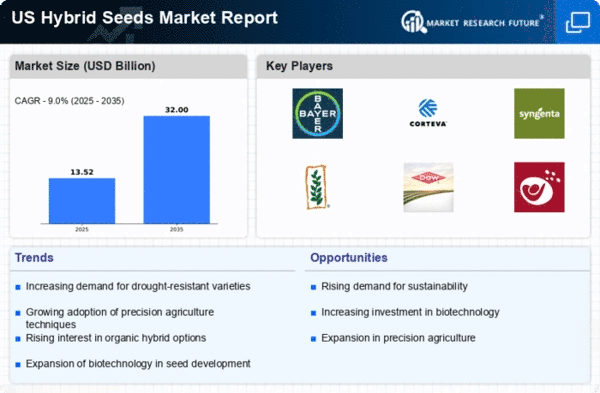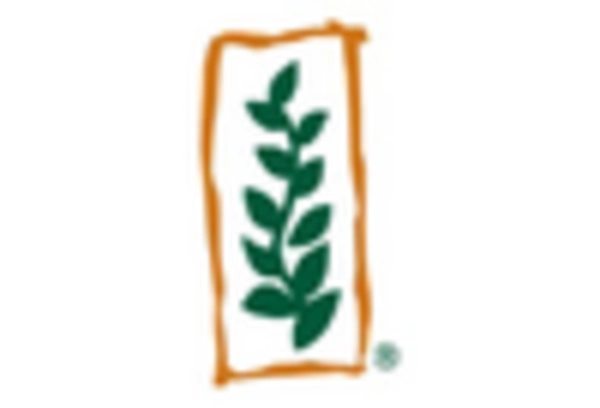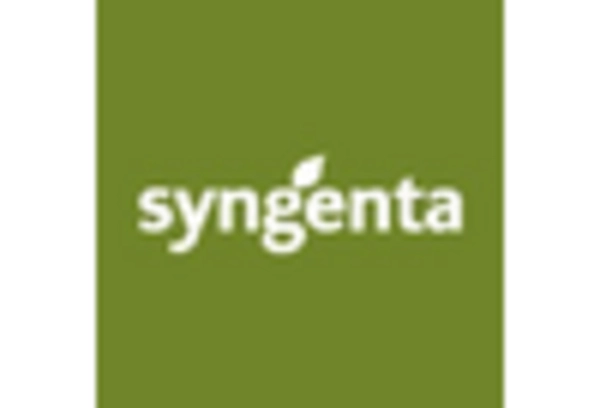Rising Demand for High-Yield Crops
The hybrid seeds market is experiencing a notable surge in demand for high-yield crops, driven by the need to enhance food production efficiency. As the population in the US continues to grow, the agricultural sector faces increasing pressure to produce more food on limited arable land. Hybrid seeds, known for their superior yield potential, are becoming essential for farmers aiming to maximize output. According to recent data, the adoption of hybrid seeds has led to yield increases of up to 30% in certain crops. This trend is likely to continue, as farmers seek to meet the food demands of a growing population while maintaining sustainable practices. The hybrid seeds market is thus positioned to benefit from this rising demand, as it aligns with the goals of both food security and agricultural productivity.
Advancements in Agricultural Biotechnology
The hybrid seeds market is significantly influenced by advancements in agricultural biotechnology, which are revolutionizing seed development. Innovations such as genetic engineering and molecular breeding techniques are enabling the creation of hybrid seeds that are more resilient to pests, diseases, and environmental stresses. These advancements not only improve crop performance but also reduce the reliance on chemical inputs, aligning with the increasing consumer preference for sustainable agricultural practices. The hybrid seeds market is witnessing a shift towards seeds that can thrive in diverse climatic conditions, potentially increasing the market size by an estimated 15% over the next few years. As biotechnology continues to evolve, it is likely to play a crucial role in shaping the future of the hybrid seeds market.
Increased Investment in Agricultural Research
Investment in agricultural research is a critical driver for the hybrid seeds market, as it fosters innovation and development of new seed varieties. Public and private sectors are increasingly allocating funds to research initiatives aimed at improving crop genetics and developing hybrid seeds that can withstand climate change and other agricultural challenges. In the US, funding for agricultural research has seen a rise of approximately 10% annually, reflecting the growing recognition of the importance of research in enhancing food security. This influx of investment is expected to accelerate the development of hybrid seeds, thereby expanding the hybrid seeds market. As new varieties are introduced, farmers will have access to improved options that can lead to higher yields and better resilience.
Consumer Preference for Organic and Non-GMO Products
The hybrid seeds market is also being shaped by consumer preferences that increasingly favor organic and non-GMO products. As awareness of food sourcing and production methods grows, consumers are demanding transparency and sustainability in their food supply. This trend is prompting farmers to adopt hybrid seeds that meet these criteria, as they seek to cater to a more health-conscious market. The hybrid seeds market is adapting by developing varieties that are compatible with organic farming practices, potentially increasing market share by 20% in the organic segment. This shift not only aligns with consumer demands but also encourages sustainable agricultural practices, further driving the growth of the hybrid seeds market.
Government Policies Supporting Agricultural Innovation
Government policies play a pivotal role in shaping the hybrid seeds market, particularly through support for agricultural innovation. Initiatives aimed at promoting research and development in seed technology are crucial for enhancing crop productivity and sustainability. In the US, various federal and state programs provide funding and resources for the development of hybrid seeds, which are essential for meeting the challenges of modern agriculture. These policies are likely to bolster the hybrid seeds market by facilitating access to advanced technologies and encouraging collaboration between research institutions and agricultural producers. As these supportive measures continue, they may lead to a more robust hybrid seeds market, fostering innovation and growth in the sector.
















